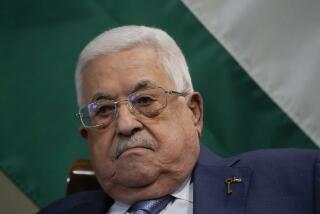Arafat Sets Timetable for Vote, Agrees to Overhaul
- Share via
JERUSALEM — Bowing to intense pressure at home and abroad to reform his government, Palestinian Authority President Yasser Arafat agreed Thursday to revamp his Cabinet and hold presidential and parliamentary elections within six months.
Arafat’s decision followed a sustained chorus of calls from his people, world leaders and his arch-nemesis, Israeli Prime Minister Ariel Sharon, to enact broad political reforms or be marginalized. The Palestinian administration is widely perceived as being rife with corruption.
Some Palestinians, who have seen Arafat fail to deliver on previous promises of reform, greeted the election announcement with cautious optimism.
“This is the best news the Palestinian people have received in months, but it’s [just] one step in the right direction,” said Nabil Amr, who recently resigned as the Palestinian Authority’s minister for parliamentary affairs to protest what he said was Arafat’s resistance to reforms.
Many Palestinians saw their neighborhoods ripped apart during Israel’s recent six-week military offensive in the West Bank. Israel attacked Palestinian militants after a suicide bomber killed more than two dozen Jews in a crowded seaside hotel March 27 during a ritual meal ushering in the Passover holiday.
In an interview published Thursday, Sharon called on world leaders to relegate Arafat to a ceremonial role and “force” on the Palestinian people an interim government that would carry out reforms. Israeli leaders maintain that the Palestinian Authority supports and funds attacks against Israeli citizens.
“There is still no concerted position about how to reform the Palestinian Authority,” Sharon said in the interview with Yediot Aharonot, Israel’s largest daily newspaper. “One thing is clear, and that is, if Arafat carries it out, nothing will happen.”
Israeli Military Reenters Jenin
Meanwhile, witnesses reported early today that Israeli tanks and soldiers reentered the Jenin refugee camp, scene of the heaviest fighting during Israel’s recent offensive. An army spokeswoman described it as a “pinpoint operation.” She added: “Arrests have been made. When we are done, we will get out.”
Sharon’s remarks came after Arafat on Wednesday pledged to Palestinian legislators that he would adopt unspecified reforms.
The Palestinian leader’s surprise announcement Thursday of an election timetable showed that Arafat had succumbed to growing domestic pressure to hold a vote despite the possibility that his popularity among Palestinians may be waning.
Earlier Thursday, Palestinian legislators demanded that Arafat trim his 30-member Cabinet to 19 people in less than seven weeks and hold parliamentary and presidential elections by the beginning of 2003. They also called on him to streamline the Palestinian Authority’s ragtag security services.
“This is the authentic, Palestinian home-grown program of reform: structural, legal, procedural, personal,” said legislator Hanan Ashrawi, in apparent reference to international pressures to revamp the government.
Shortly after Arafat received the legislators’ list of demands, his advisor, Ahmed Abdel Rahman, announced in the West Bank city of Ramallah that the Palestinian president had approved the package.
“The core of the changes will be conducting general elections in a period that will not exceed four to six months,” Rahman said, adding that Arafat has called for a meeting of his administration’s election body within two days.
Amr, the former parliamentary affairs minister, called on President Bush and other world leaders to pressure Sharon to lift blockades of Palestinian towns and villages so that prospective candidates could campaign effectively.
Sharon showed no immediate signs Thursday of easing up the pressure on Palestinians. Israeli tanks rolled into Beitunia, a suburb of Ramallah, killing a member of Arafat’s security forces. The military said 25-year-old Ahmed Ghanam was planning to help carry out a terrorist attack in nearby Jerusalem. About two dozen Palestinians were arrested in other Israeli army raids near Nablus and other areas, which Sharon said would continue until militants were uprooted.
Analysts said Arafat’s challenge will be to enact enough reform measures to blunt internal and external pressure.
Elections May Put Pressure on Sharon
But the run-up to Palestinian elections also could put Sharon under pressure to pull Israeli troops out of the West Bank, end the controls exerted over East Jerusalem and dismantle the many checkpoints throughout the West Bank that restrict people from moving--and voting.
“Sharon either has to put up with this election or face up to the world,” said Ali Jirbawi, a political scientist with the West Bank’s Bir Zeit University.
The elections, if held, would present Arafat with the most serious challenge yet to his near-absolute rule. The last Palestinian elections were held in 1996, and Arafat won with 88% of the vote. At that time, however, there was greater optimism among Palestinians in the wake of the 1993 Oslo peace accords. This time voters would probably be far less hopeful, Jirbawi said.
There would be many variables in the coming elections, including what kind of rules apply and whether radical factions such as Hamas and Islamic Jihad participate.
Palestinian pollster Khalil Shikaki said Arafat’s performance at the polls could strengthen his hand in the peace process. A strong showing would give him a mandate in any future peace talks with Israel, he said.
More to Read
Sign up for Essential California
The most important California stories and recommendations in your inbox every morning.
You may occasionally receive promotional content from the Los Angeles Times.













